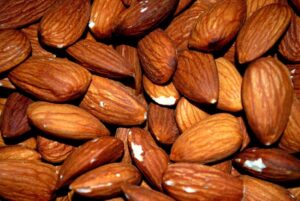Instead of rice, imagine pelting newlyweds with almonds as they leave for their honeymoon. Although it would be expensive and perhaps dangerous today, that’s what the Romans tossed two thousand years ago as a fertility blessing. While I’m not sure of the quantity of nuts thrown, I hope hard hats were part of the acceptable wedding attire.
People are going nuts for almonds these days. This Mediterranean native has become a very popular snack and its milk has even surpassed soy as a substitute for what God makes with His four legged bovines. These delectable treats are high in Vitamins B and E as well as several important minerals. They also have been shown to lower LDL Cholesterol which reduces heart disease. Add their delightful taste to their resume and what’s not to like?
Almonds have been eaten for thousands of years and are mentioned in the Old Testament books of Genesis, Exodus, Numbers, Ecclesiastes and Jeremiah. Although some wild varieties are toxic, others are beneficial and have been cultivated throughout the Middle East for centuries.
The first almonds were brought to California in the 1700s and today that state dominates not only US production, but that of the entire world. The fertile San Juaquin Valley produces many tons of almonds annually and they are currently California’s top agricultural export. Considering the strength of that state’s other agricultural industries, this is no small success! 
Whereas many fruits and nuts are harvested by hand, these tasty treats are collected through a rather unique process. As the nuts mature from now into late fall, machines are used to vigorously shake the tree trunks causing the nuts to fall to the ground. They lie and dry on the orchard floor for a week or so before another machine sweeps them up for transport to the processing facility. Again, I hope the operator is either in an enclosed cab or outfitted with a sturdy helmet.
The harvest of almonds gives us insight into the gleaning of truth and guidance from God’s Word. Many times we casually read the Scriptures pulling off only the fruit that is on the lower, easier to grasp, branches. We then go quickly to the next chapter or verse doing the same there adding to our sometimes shallow collection of Biblical knowledge and understanding. Perhaps a better method is to spend some extra time in each passage, shaking it vigorously to dislodge all of the beneficial lessons God has placed there for us.
We can shake the Scriptures in many ways, including repeated readings as well as the use of various reliable translations. In addition, quiet reflective meditation can unlock deep truths we may not notice in casual reading. We can also discuss the passages with other believers to see what insights God has revealed to them. Commentaries are helpful to jiggle loose even more tasty morsels and provide perspectives we may have not considered. Most importantly, we need the Author’s Holy Spirit to reveal and extricate every bit of understanding from each branch and twig. As we do so, the Bible’s rich abundance becomes available to nourish not our bodies, but our souls and spirits.
As we read God’s Holy Word, let us take the time to shake the branches for the spiritually nutritious fruit He has placed there for us. May we interact with other believers to deepen our perceptions and ask God to show us how to apply His important truths to our lives.
Above all, we must allow God’s Word to change us. Almonds do us no good if they are only grown, harvested, and dried. They must be eaten and digested before their nutrients become beneficial to our systems. So too, we must allow God’s Word to digest within us and work its way out through every aspect of our character. If we do so, it holds the potential of reducing our congenital heart disease of sin and improving our taste as we relate with others. Ultimately, it reveals the Healer Himself who can grant eternal life to all who ask.
The next time you enjoy the nutritious blessings known as almonds, thank the One who designed them. And may this reflection on their harvest technique help to inform your reading, understanding, consumption, and obedience of His Word.
Blessings, George